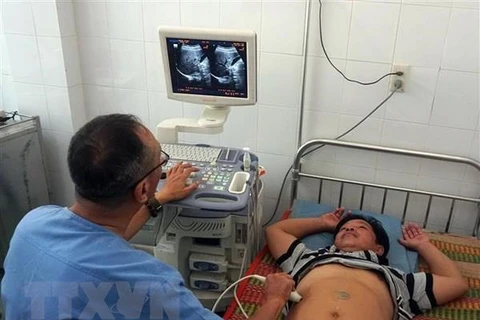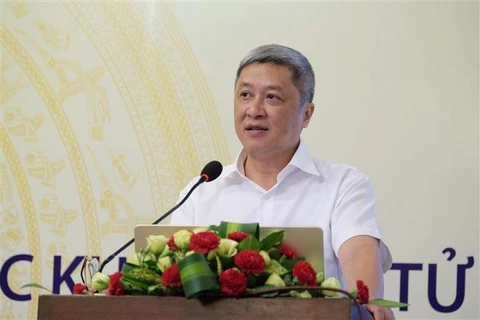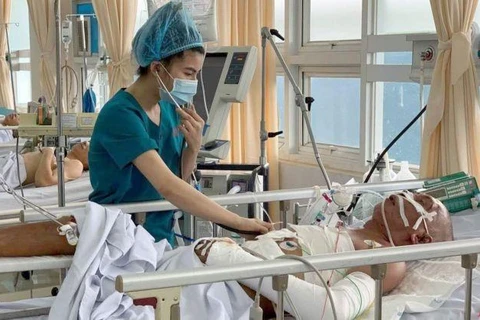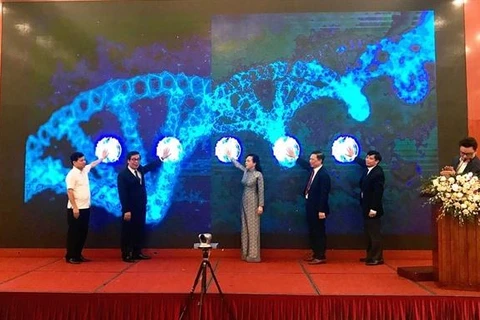 Digitisation of the healthcare sector is important to better serve patients, but hacking by cybercriminals is a grave risk, and great efforts are needed to keep patient information secure (Photo: VNA)
Digitisation of the healthcare sector is important to better serve patients, but hacking by cybercriminals is a grave risk, and great efforts are needed to keep patient information secure (Photo: VNA) HCM City (VNS/VNA) - The development of technologies such as 4G, 5G, internet of things and artificial intelligence has rapidly changed the healthcare sector’s landscape globally, including in Vietnam, with more organisations adopting digitisation, according to experts.
The goal is to have multiple affiliated organisations sharing patients’ digitised medical records to provide more holistic health care.
Many health care institutions are also using smart equipment to carry out conventional tasks. For example, various devices measuring vital signs today are directly connected to the hospital’s systems. Once measurements are taken, the data is incorporated directly in the patient’s medical records without the need for manual intervention.
New technologies have enabled the health care industry to carry out remote operations. For instance, earlier this year, a surgeon in China successfully carried out an operation remotely.
Digitisation across the health care industry has helped service providers improve the quality of care and accelerate medical breakthroughs for better patient outcomes and mitigate the rising cost of health care.
The Vietnamese Government is also supporting the digitalisation of healthcare, launching projects to encourage and enable digital health solutions to be adopted around the country.
According to the Ministry of Health, all health care establishments will complete digitisation of medical records by 2030.
According to the Australian Trade and Investment Commission (Austrade) in Vietnam, Vietnam’s economic growth, health-conscious population and fast-developing 4G and 5G infrastructure provide the perfect environment for digital health solutions.
There is strong interest in telemedicine and advanced technologies and systems that can improve decision making, improve operational efficiency and enhance patient care and experience, it said.
Yeo Siang Tiong, general manager of Kaspersky Lab Southeast Asia, said most hospitals were in the first stage of digital transformation, digitising simple data such as patient records, personal information, past diagnosis, and medicine.
But the digitisation of the healthcare industry had led to a massive increase in the number of targeted attacks against the sector, he said.
“The health care sector tracks a person’s medical history, personal information, sometimes they also track who their parents are, and genetic conditions that pass down from parents to child.
“Some of this information is actually worth more than a bank card.”
In addition, "the sector is less protected than sectors such as banking and finance," he said.
In the health care industry, cyber security should not be taken slightly because any issue could be a matter of “life and death,” he warned.
“What would happen when you need to treat a patient in an emergency room, but the information is suddenly not available. It is a life and death situation. It is actually very dangerous.”
At a recent conference on cybersecurity in the health care sector, experts said the consequences of a breach could be quite detrimental since health care records are highly personal and sensitive in nature.
If patients’ records were stolen, their private data could be traded on the dark web to be exploited by cybercriminals for scams and frauds, and worse still it could cause tremendous trauma to the patients, they said.
Yeo said to protect the healthcare industry from cybercrimes, it was very important to “raise security awareness not just among IT workers but also users of the equipment, doctors, nurses, and healthcare workers.”
"A lot of hospitals do not have chief security information officers," he said, suggesting that they should focus on developing human resources to ensure cyber security, he said.
The health care sector is a critical one, and therefore hospitals, public and private, should start drafting regulations to address the rising threats, according to Yeo./.
VNA























